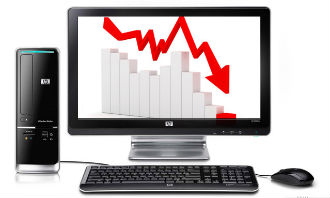 The mobile PC market has suffered its worst performance in 11 years, according to an IHS report.
The mobile PC market has suffered its worst performance in 11 years, according to an IHS report.
Mobile PC shipments worldwide sank 6.9 percent compared to the first three months of the year, marking the first sequential decline since Q2 2002. Traditionally there has been growth in the second quarter, with the exception of 2002 and now, including last year where mobile PCs grabbed a 3.9 percent boost.
But analyst group IHS believes the poor results will spread beyond the second quarter. Taking the first half of 2013 overall, mobile PCs have had the worst performance since 2003 – with a 11.2 percent contraction compared to the same time last year. This can be compared to a 41.7 percent surge as recently as 2010 to understand where the industry has found itself.
Ultrabooks have failed to woo consumers and, in the midst of global economic crisis, potential buyers are holding off on upgrading, even with price cuts and special offers from manufacturers.
“The mobile PC industry on the whole is struggling to find any momentum for growth as upheavals rock the market,” IHS compute analyst Craig Stice said. “In particular, more nimble devices like media tablets have taken over among consumers given their ease of use and unique form factor”.
IHS noted that innovation in mobile PCs has stagnated and low cost tablets have taken away further market share.
This all fits in nicely with the dominating narrative that the PC is dead, but this will not be the case. Although tablets are a far nicer experience for computing on the go or lazing around at home, it’s rather hard to get an essay done or other work finished on those devices. Instead PC makers will have to adapt and understand that the world is simply too out of pocket to justify upgrading to a new machine every couple of years. PCs have gone from being all in one devices to finding their niche in useful work or serious gaming. The rest can be done with a tablet or smartphone.
As IHS says, Intel’s Bay Trail and AMD’s Temash processors could inject some life into the market as PCs become lower cost, but higher performance and lower power. PC makers, IHS says, are “contemplating a new class of performance PCs that would incorporate the new processors at affordable prices”.
There is still a current of hope for ultrathin devices, too, but Intel really put all its eggs in one basket when it arrogantly thought high cost Macbook Air knock-offs would fly off the shelf as the whole world got seriously more out of pocket.
“If a new low-cost PC offering strong performance can become available on the market and meet consumer expectations, then PCs could be set for more growth,” Stice said. “Not like the glory days of the 2000s, but growth nonetheless.”





